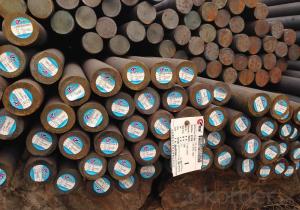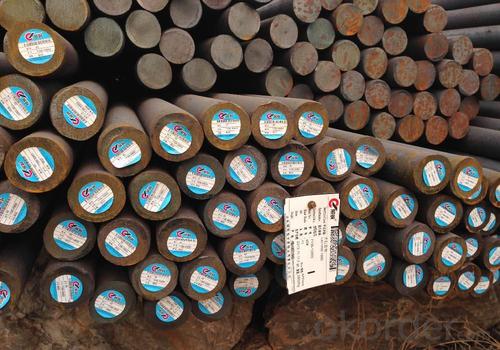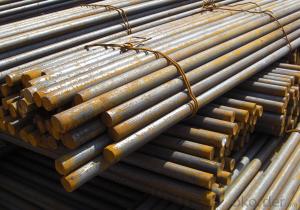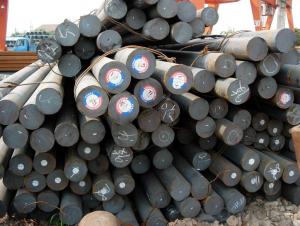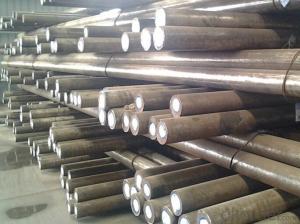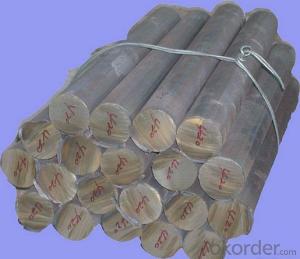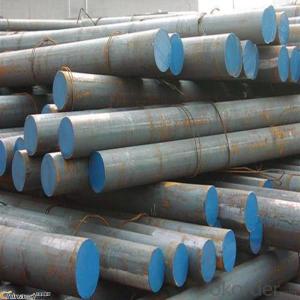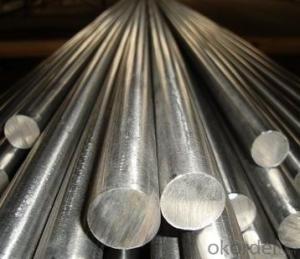Special Steel DIN 25CrMo4 Hot Rolled Steel Round Bars
- Loading Port:
- China main port
- Payment Terms:
- TT OR LC
- Min Order Qty:
- 30 m.t.
- Supply Capability:
- 10000 m.t./month
OKorder Service Pledge
OKorder Financial Service
You Might Also Like
Specification
Product Information
1 Standards and Chemical Composition:
GB | DIN | JIS | BS |
20CrMo | 25CrMo4 | SCM420 | 25CrMo4 |
C | Si | Mn | P | S | Cr | Ni | Cu |
0.17-0.23 | 0.15-0.35 | 0.55-0.90 | 0.030 | 0.030 | 0.85-1.25 | 0.30 | 0.30 |
2 Mechanical Property:
Yield Strength (MPa) | ≥685 |
Tensile Strength (MPa) | ≥885 |
Elongation (%) | ≥12 |
Hardness (HB) | ≤197 |
Reduction in Area (%) | ≥50 |
AKV (J) | ≥78 |
3 Brief Introduction:
Dimension | 14-350mm |
Length | 2-13m or as per your request |
Delivery condition | Hot rolled |
Heat Treatment | Normalizing, Annealing, Quenching |
Packing | Standard seaworthy packing or according to your requirements |
Product Show
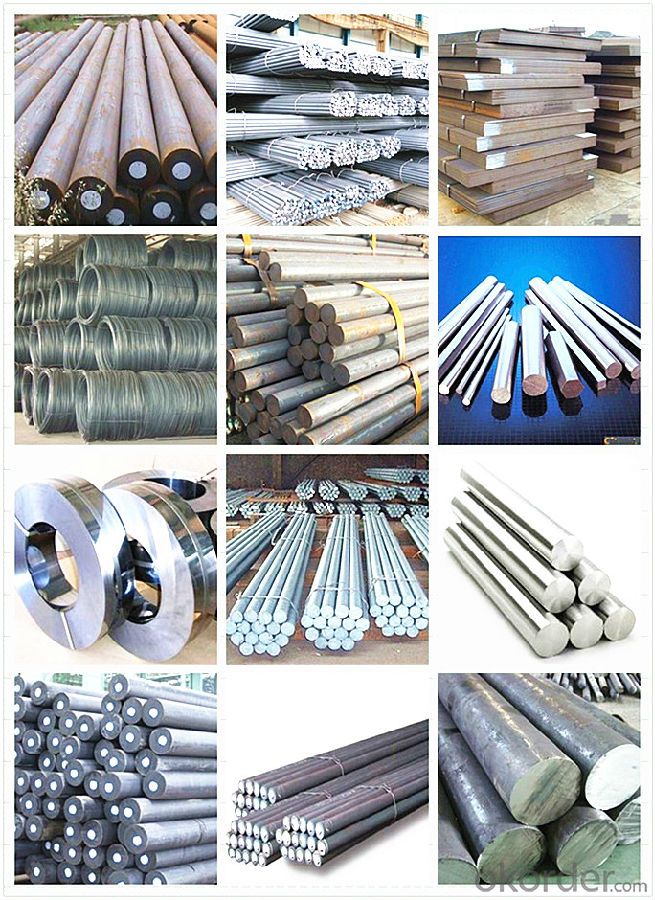
Workshop Show
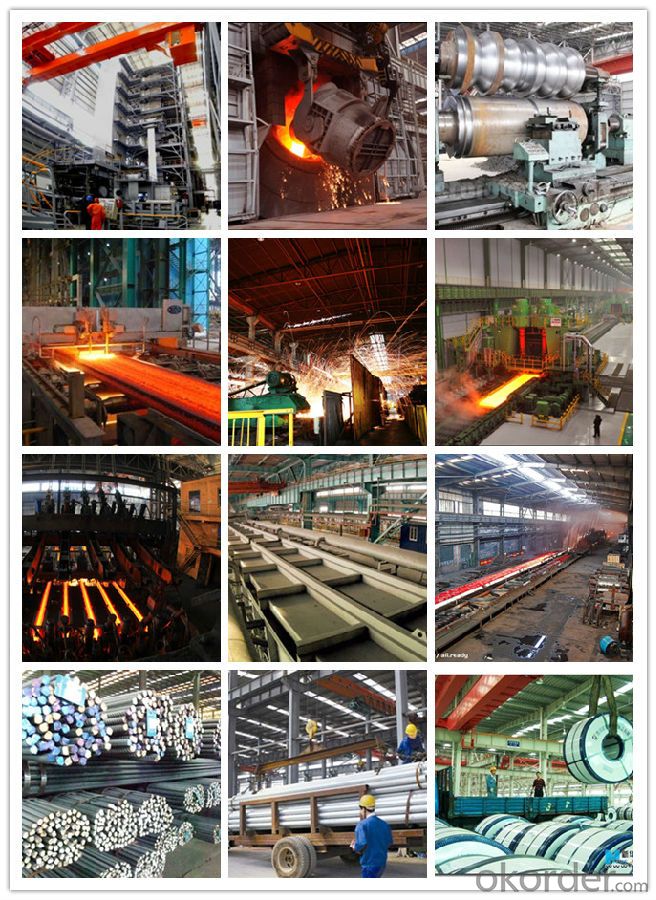
Shipping
1. FedEx/DHL/UPS/TNT for samples, Door-to-Door;
2. By Air or by Sea for batch goods, for FCL; Airport/ Port receiving;
3. Customers specifying freight forwarders or negotiable shipping methods!
Delivery Time: 3-7 days for samples; 5-25 days for batch goods.
Payment Terms
1.Payment: T/T, L/C, Western Union, MoneyGram,PayPal; 30% deposits; 70% balance before delivery.
2.MOQ: 1pcs
3.Warranty : 3 years
4.Package Informations: 1) EXPORT, In 20 feet (GW 25 ton) or 40 feet Container (GW 25 ton)
2)as customer's requirement
Why choose us?
(1) The leading exporter in China special steel industry.
(2) Large stocks for various sizes, fast delivery date.
(3) Good business relationship with China famous factories.
(4) More than 7 years steel exporting experience.
(5) Good after-sales service guarantee.
- Q: How does special steel perform in oil and gas applications?
- Special steel is highly desirable and widely used in oil and gas applications due to its exceptional performance and superior properties. Special steel exhibits excellent resistance to corrosion, which is crucial in environments where oil and gas are present. This resistance to corrosion helps prevent equipment failure and ensures the longevity and reliability of the components. Moreover, special steel possesses high strength and durability, making it suitable for withstanding extreme conditions, such as high pressure and temperature. This strength allows the steel to withstand the demanding and harsh environments that oil and gas applications often present. Additionally, special steel can retain its mechanical properties even at elevated temperatures, providing stability and reliability in these challenging conditions. Another significant advantage of special steel is its excellent weldability. This property allows for easy fabrication and assembly of components, reducing production time and costs. It also ensures the integrity of the structures and equipment used in oil and gas applications. Furthermore, special steel offers exceptional resistance to fatigue and wear, which are common concerns in oil and gas operations. The ability of special steel to withstand cyclic loading and abrasive conditions ensures the longevity and reliability of the components, reducing maintenance and replacement costs. Overall, special steel performs exceptionally well in oil and gas applications due to its corrosion resistance, high strength, durability, weldability, and resistance to fatigue and wear. Its superior properties make it a preferred choice for critical components, ensuring the efficiency, safety, and reliability of oil and gas operations.
- Q: How does special steel perform in terms of chemical resistance?
- Special steel typically performs very well in terms of chemical resistance. Its composition and properties make it highly resistant to corrosion and oxidation, allowing it to withstand exposure to various chemicals without significant degradation. Additionally, special steel can be specially alloyed or treated to enhance its chemical resistance even further, making it an excellent choice for applications in industries such as oil and gas, chemical processing, and marine environments.
- Q: How is special steel used in the packaging supply chain?
- Special steel is used in the packaging supply chain for various purposes such as manufacturing machinery, tools, and equipment needed for packaging processes. It is used to create durable and reliable components like blades, cutters, and molds, ensuring precise and efficient packaging operations. Additionally, special steel can be utilized for constructing robust packaging materials like containers, pallets, and racks, providing strength and stability during transportation and storage.
- Q: What are the different types of heat treatment processes used for special steel?
- The different types of heat treatment processes used for special steel include annealing, normalizing, hardening, tempering, and quenching.
- Q: What are the applications of special steel in the marine sector?
- Special steel is extensively used in the marine sector due to its unique properties. It is used in various applications such as shipbuilding, offshore platforms, and marine equipment manufacturing. Special steel provides excellent corrosion resistance, high strength, and durability, making it ideal for marine environments that are highly corrosive and subject to extreme conditions. It is used for constructing hulls, propeller shafts, pipelines, and various components of ships and offshore structures. Additionally, special steel's ability to withstand impact and fatigue makes it suitable for marine applications where safety and reliability are crucial.
- Q: How does special steel perform in erosion applications?
- Special steel is renowned for its extraordinary performance in erosion applications, owing to its distinctive attributes such as elevated hardness, resistance to corrosion, and wear resistance, which render it exceptionally well-suited for environments where erosion is a prevalent concern. Erosion, which entails the gradual deterioration of a material due to external forces like abrasion, impact, or cavitation, can pose significant challenges in industries like mining, oil and gas, and chemical processing. In such cases, regular steel may prove inadequate in withstanding the harsh conditions and may rapidly succumb to degradation. Conversely, special steel is purposefully designed to endure erosive forces and maintain its structural integrity over an extended lifespan. Its high hardness empowers it to withstand abrasion and impede rapid material degradation, thus making it an ideal choice for applications involving the movement of abrasive materials or fluids. Moreover, special steel exhibits exceptional corrosion resistance, a vital characteristic in erosive environments. It can effectively withstand the corrosive impact of chemicals, moisture, and other harsh substances, thereby guaranteeing the material's durability and performance. Additionally, special steel offers exceptional wear resistance, which enables it to endure repeated impacts, high pressures, and sliding contact without experiencing significant damage. This quality makes it remarkably effective in erosion-prone applications, consequently minimizing downtime and maintenance expenses associated with material replacement or repair. In conclusion, the properties of special steel establish it as a dependable and long-lasting option for erosion applications. Its capacity to withstand abrasion, corrosion, and wear ensures that it can thrive in demanding conditions often encountered in such environments, ultimately delivering enduring performance and diminishing the necessity for frequent replacements.
- Q: What is the maximum temperature that special steel can withstand?
- The maximum temperature that special steel can withstand depends on the specific type of steel being used. Special steels are designed to have enhanced properties, such as high heat resistance, which allows them to withstand higher temperatures than standard steels. For example, some special steels, such as heat-resistant stainless steels, can withstand temperatures up to around 1200 degrees Celsius (2200 degrees Fahrenheit). These steels are often used in applications where high temperatures are encountered, such as in furnaces, boilers, and exhaust systems. Other types of special steels, such as tool steels or high-speed steels, may have different maximum temperature limits. These steels are commonly used in cutting tools, molds, and machining applications, where they need to maintain their hardness and strength at elevated temperatures. It is important to note that the maximum temperature that special steel can withstand also depends on factors such as the duration of exposure to the high temperature, the specific alloy composition, and any additional heat treatment processes that have been applied. Therefore, it is crucial to consult the manufacturer's specifications or seek professional advice for accurate information on the maximum temperature limit for a particular type of special steel.
- Q: How does special steel contribute to improving product sustainability?
- Special steel contributes to improving product sustainability in several ways. Firstly, it offers enhanced durability and strength, which means that products made from special steel have a longer lifespan and reduced need for frequent replacements. This reduces the overall impact on the environment by minimizing waste generation and conserving resources. Secondly, special steel often has high corrosion resistance, making it suitable for use in various industries, including construction, automotive, and aerospace. This resistance to corrosion ensures that products made from special steel require less maintenance and repairs over time, reducing the consumption of energy, materials, and resources. Additionally, special steel can be recycled and reused efficiently. This recyclability reduces the demand for new raw materials, decreases energy consumption, and minimizes greenhouse gas emissions associated with the production of steel from virgin materials. By using recycled special steel, companies can contribute to a circular economy and reduce their environmental footprint. Overall, the utilization of special steel in various products contributes to their longevity, reduced maintenance needs, and recyclability, all of which are essential for improving product sustainability and minimizing environmental impact.
- Q: How does special steel perform in terms of hardness?
- Special steel performs exceptionally well in terms of hardness. Due to its unique alloy composition and precise manufacturing process, it exhibits superior hardness compared to conventional steel. This enhanced hardness allows special steel to withstand high pressures, resist wear and tear, and provide excellent performance in demanding applications across various industries.
- Q: How does the microstructure of special steel affect its performance?
- The performance of special steel greatly depends on its microstructure. To enhance their properties and meet specific application requirements, special steels are alloyed with specific elements. The microstructure refers to how the steel's crystalline grains are arranged and whether any phase transformations are present within the material. One important aspect of the microstructure is the size of the grains. Through controlled cooling or adding alloys, fine-grained structures can be achieved, leading to improved strength, hardness, and toughness. Smaller grain sizes restrict the movement of dislocations within the material, resulting in increased strength and hardness. This is particularly crucial in applications where high strength-to-weight ratios are needed, such as aerospace or automotive components. The presence of different phases in the microstructure is another critical factor. By adding specific alloying elements, the formation of various phases like martensite, bainite, or ferrite can be promoted. These phases possess different mechanical properties, including hardness, toughness, and corrosion resistance. By carefully controlling the microstructure, it becomes possible to customize the steel's performance for specific applications. For instance, martensitic structures offer high hardness and wear resistance, making them ideal for cutting tools, while bainitic structures provide a good balance of strength and toughness, making them suitable for structural components. Moreover, the microstructure also determines how the steel responds to heat treatment processes like quenching and tempering. Heat treatments can modify the microstructure to achieve desired mechanical properties, such as increasing hardness or improving resistance to fatigue. The ability of the microstructure to transform during heat treatment enables precise control over the steel's performance characteristics. In conclusion, the microstructure of special steel has a significant impact on its performance. Grain size, phase distribution, and response to heat treatment are all crucial factors that influence the steel's mechanical properties and suitability for specific applications. By understanding and manipulating the microstructure, engineers can design special steels with enhanced performance, meeting the demanding requirements of various industries.
Send your message to us
Special Steel DIN 25CrMo4 Hot Rolled Steel Round Bars
- Loading Port:
- China main port
- Payment Terms:
- TT OR LC
- Min Order Qty:
- 30 m.t.
- Supply Capability:
- 10000 m.t./month
OKorder Service Pledge
OKorder Financial Service
Similar products
Hot products
Hot Searches
Related keywords
